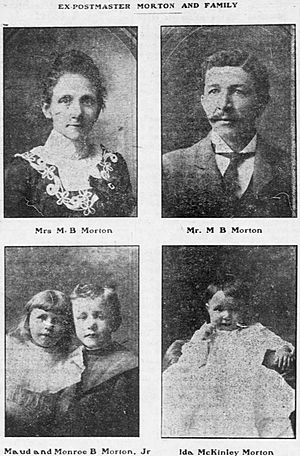Monroe Morton facts for kids
Monroe Bowers Morton, also known as Pink Morton (born July 31, 1856 – died February 12, 1919), was an important person in Georgia during the late 1800s. He owned buildings, published a newspaper, built things, and even worked as a postmaster. As an African American leader, he spent most of his life in Athens, Georgia. There, he started a newspaper and built the famous Morton Building. This building included the Morton Theatre, a place for shows, and offices for Black doctors and pharmacists. Important people like Dr. Ida Mae Johnson Hiram, the first Black woman licensed to practice dentistry in Georgia, worked there. Dr. William H. Harris, who helped start a medical group for Black professionals, also had an office in the building.
Contents
Early Life and Education
Monroe Bowers Morton's mother was formerly enslaved. She was of mixed race. His father was white. People called him "Pink" because his skin was light. Before the American Civil War (1861–1865) ended slavery in Georgia, Morton went to a secret school. This school was led by Reverend James Sims in Savannah, Georgia. Later, he studied at the Knox Institute. After that, he worked as a messenger for Major John J. Knox of the Freedmen's Bureau. The Freedmen's Bureau helped formerly enslaved people after the Civil War.
Building a Business Career
After working for Major Knox, Morton became a survey engineer. He worked on the "North Eastern Railroad" with Bill Pledger. Pledger later became involved in politics too. Morton eventually moved to Athens, Georgia. There, he became a key leader in the Black business and political world.
Morton owned many buildings in Athens, between 20 and 35 of them. He was chosen to be a builder for the Wilkes County Courthouse. He also worked on a Federal Building in Anniston, Alabama. Besides building, he published a newspaper called The Progressive Era.
The Famous Morton Building
In 1909, Morton bought a piece of land. He finished building the Morton Building in 1910. This building was very important for the Black community. It had offices for Black doctors, lawyers, and other professionals. It also housed the Morton Theatre. This theater first showed vaudeville acts, which were different kinds of stage shows. Later, it became a movie theater. Today, the Morton Theatre has been fixed up and is used as an arts center.
The Morton Theatre was sometimes called Morton's Opera House. Many famous Black performers came to play there. Some even came from New York City's famous Cotton Club. Big names like Duke Ellington, Bessie Smith, Ma Rainey, Louis Armstrong, and Cab Calloway performed at the theater. Morton himself lived in a large, two-story house in Athens.
Political and Public Service Work
Monroe Morton also became active in politics. He was a delegate for Athens at the 1884 Republican National Convention. This was a big meeting where the Republican Party chose its candidate for president. After that, he was appointed as a postal agent. This meant he helped manage mail on the Gainesville, Jefferson, and Southern railroad. Later in 1884, he switched routes. He was worried about his safety on his first route.
Morton was connected to a powerful politician named Alfred Eliab Buck. Morton was a delegate again at the Republican National Convention in 1896, 1900, and 1904. In 1896, he was part of the group that told William McKinley he was chosen to run for president.
He was then appointed postmaster in Athens. He was the second African American to hold this important job in Athens. The first was Madison "Matt" Davis, who was also a former slave and politician. Both Morton and Davis faced opposition from some white people in Georgia. These people did not want Black officials in power. Other Black officials in Georgia, like Judson Whitlocke Lyons and John Thomas Heard, also faced challenges. In 1897, the Postmaster General decided not to allow Black people to be postmasters in large Southern cities. However, President William McKinley still appointed Morton in Athens and Lyons in Augusta. These choices were not popular with everyone. Morton faced criticism, especially when he was considered for reappointment in 1901 and 1902. He was not chosen again by President Theodore Roosevelt.
Later Life and Lasting Impact
Monroe Bowers Morton passed away in 1919. He is buried in the Morton family plot at Gospel Pilgrim Cemetery in Athens.
In 2013, a filmmaker named Keith Plummer started making a movie about the Morton Theatre and Morton himself. The area around the theater is often called "Hot Corner." It was a busy center for Black businesses and culture in Athens in the early 1900s. The film, which is 30 minutes long, was shown for the first time in 2015 at the theater. It includes an interview with Morton's grandson. Morton's legacy continues to be celebrated in Athens.
 | Aurelia Browder |
 | Nannie Helen Burroughs |
 | Michelle Alexander |


